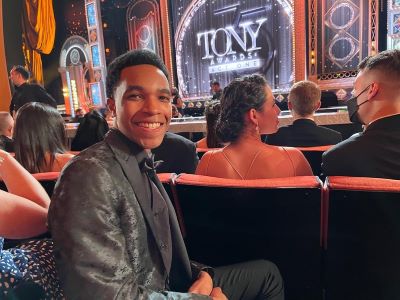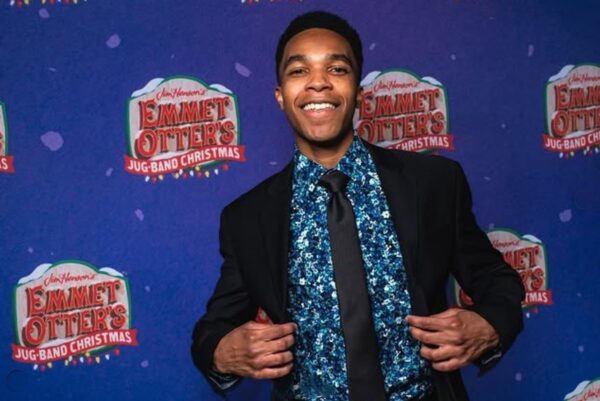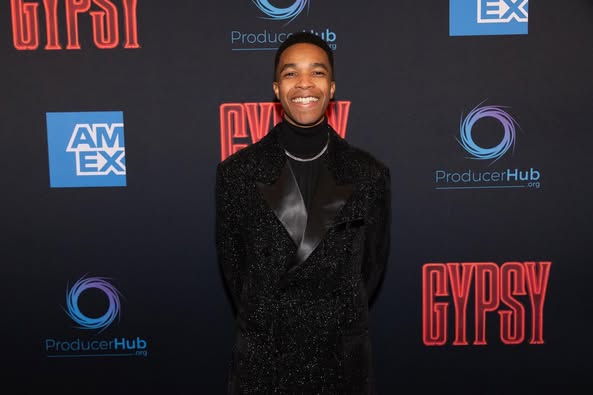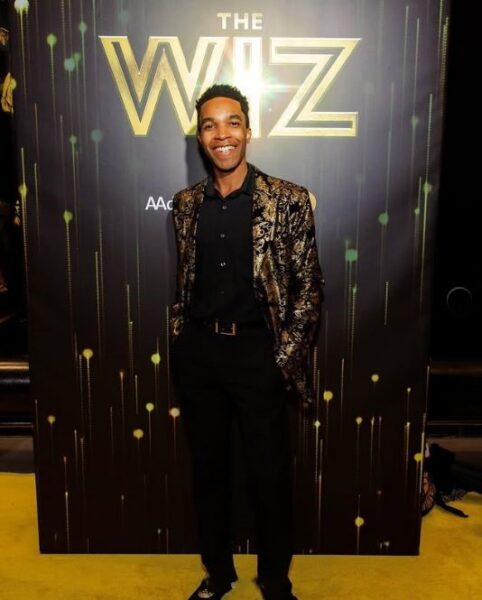ALEXANDER ROBERTSON.
HIS NAME IS ALEXANDER ROBERTSON.
At the tender age of 26, Alexander Robertson has made a mark on Broadway as a co-producer with his current show roster including Cabaret at the KitKat Club, Gypsy, and the upcoming Smash and Boop!, both opening this spring. His past credits have included Appropriate, The Wiz, New York, New York, The Piano Lesson, A Beautiful Noise, and the revival of Kinky Boots. He is also currently involved on the producing team for the national tour of Here There Are Blueberries. And his new slate of productions in development includes the play Insurance and a feature film, The Mensch, starring Jonah Platt. Along with being the founder of Emlex Entertainment and co-founder of DMQR Productions, he is working on a project to mend the sports and theatre world. And to make it international, Alex will be producing a show in July on the West End.
Stage and Cinema is fascinating by our new era of producing, which is far from the days when The Theatre Guild, Rodgers & Hammerstein, and David Merrick were responsible for raising capital. Today, Broadway has lead producers, executive producers, and co-producers (some producers are a single business but with more than one person). We wanted insight into large team-producing shows (Hadestown had 49 producers listed above the title—that’s 49 Tony Award winners!), so we asked one of our lead critics Michael Landman-Karny to have a chat with this Broadway wunderkind producer.
Alexander Robertson (photo by Paul Aphisit)
Michael Landman-Karny: What was your path to becoming a Broadway producer?
Alexander Robertson: Like any artistic path, mine was unique and not necessarily planned. I’ve been involved in the arts from a young age, training as a professional actor and earning a BFA in theater [from The Hartt School, University of Hartford]. While studying, I focused on performing arts management to supplement my education because I was deeply interested in the business of Broadway—something that many actors and artists don’t typically learn about.
Graduating during the pandemic forced me to pivot. I briefly attended Carnegie Mellon University’s Entertainment Industry Management program, thinking I might become a studio executive or a Broadway producer. There isn’t a clear roadmap to becoming a producer—no set pipeline exists—but I assumed grad school would help. However, once I got there, I realized that I already was a producer; I just needed to pursue opportunities wherever they arose.
Leaving grad school at the height of the pandemic, I moved to New York and started reaching out to industry professionals. I cold called and emailed as many people as I could, referencing Playbills and identifying artists I admired. To my surprise and gratitude, many people responded. One of those conversations was with Thomas Laub, a young producer, who gave me my first opportunity to co-produce a Off- Broadway show.
To be taken seriously in the industry, I needed my name “above the title” on a production. My first task was to raise $75,000 for an Off-Broadway production. I was initially shocked to realize there was a financial barrier to becoming a producer, even though I had the skills to contribute to a production team. But I saw fundraising as a crucial skill to learn, one that would help me build a sustainable future for my own projects. After four to five months of trial and error, I not only met my goal but surpassed it. That experience validated what another producer told me early on: once people see that you’re producing, you’ll continue to be invited to work on projects.
One of my cold calls during this period led me to Tim McDonald, CEO of iTheatrics, who offered me my first job in New York City. Much of my path wasn’t about intentionally reaching a particular destination—it was about putting myself out there, being persistent, and embracing opportunities as they arose.
After working with Tim on productions like Jim Henson’s Emmet Otter’s Jug-Band Christmas, I began co-producing Broadway shows. In the summer of 2022, I had lunch with Tom Kirdahy, who was producing The Piano Lesson on Broadway. He casually mentioned an opportunity to co-produce, and I jumped at the chance. Co-producing often involves raising anywhere from $125,000 to $500,000, depending on the show. Beyond financing, co-producers act as board members, provide creative input, and serve as ambassadors, using their networks to promote the production. Learning these financial and strategic aspects has allowed me to navigate my career toward producing my own projects. Today, I’m leading four productions, including one premiering in London this summer and another in development for workshops later this year.
ML-K: What are the rules and regulations that govern investing in Broadway shows?
AR: Broadway investments are regulated by the SEC [US Securities and Exchange Commission], so investors must be accredited.
One of the aspects I cherish most about producing is offering people the chance to be part of something great—an opportunity they might not otherwise be approached for. Many of my investors come from my personal network, while others reach out after seeing my past work. Educating first-time investors is a big part of my role. Broadway is a high-risk industry—only about one in five shows recoups its investment—but I am always transparent about those realities. My goal is to make the experience enjoyable for investors, whether or not the show is financially successful. They get to attend opening nights, exclusive events, and gain insider access to the production process.
ML-K: Is selling streaming or TV rights to platforms like Netflix or PBS a significant part of recouping investment in a show?
AR: It depends on the deal. With Broadway productions costing around $20 million to mount, weekly profits go toward recouping that investment. If a show is filmed and distributed, the financial impact depends on the contract. Revivals are more complex since the original IP [Intellectual Property] is licensed rather than owned.
Contracts for Broadway productions—what we call the “mother production”—outline subsidiary rights, including potential film adaptations, merchandise, and licensing. Some productions benefit from these additional revenue streams, while others don’t. A show may not recoup its investment on Broadway but could become profitable through regional productions or licensing. For example, The Addams Family wasn’t a financial success on Broadway but became one of the most licensed shows for high schools, ultimately recouping its investment.
ML-K: When deciding to produce a show, how do you balance artistic merit with commercial viability?
AR: As both an artist and a businessperson, I take this decision very seriously. Some shows are artistically perfect for Broadway but financially unviable. I tailor my recommendations based on investors’ goals—whether they want to support the arts philanthropically or expect a return on investment.
For instance, there are shows that I love but I know would be difficult to recoup on Broadway and as a result I don’t bring it to my investors. On the other hand, there are shows, while not personally exciting to me artistically, but have strong financial potential which makes them a worthwhile investment opportunity.
Anant Das, Alexander Robertson, Carmen A. Quiñones, and Afsheen Misaghi: co-founders of DMQR Productions
ML-K: What shows do you currently have in development?
AR: I am working on a plethora of projects, but the most upcoming is The Show on the Roof. It’s going to the King’s Head Theatre in London this summer. It’s a show about the 1950s Boys of Boise scandal, where they were essentially arresting men on suspicion of potentially being gay. The show is a candid, Cabaret-like musical that explores what happens to the people in this town in the 1950s after this moment. It’s really beautiful—written by Tom Ford and composed by Alex Syiek. It was the first project I championed as a lead producer, and I’ve been with it for about three and a half years now. I’m really excited about bringing it to the UK this summer.
Another project that is in development, which is super exciting, is called Yasuke: The Legend of the Black Samurai. We recently announced that it will be going to Broadway in the next couple of years. It’s an original musical, blending historical events with fictional elements, set in 16th-century Japan. It recounts the journey of Yasuke, an African man uprooted from his native land of Mozambique only to be brought to Japan where he is bestowed with respect in a society known for its discipline and moral codes. The show is written and composed by Bálint Varga with lyrics by Azusa Fujikura, Joel René Scoville and Joe Barros and will be directed and choreographed by Joanne M. Hunter. This is one of my favorite projects to develop, and we have an amazing team. It reminds me of the big epic shows I saw when I was younger, like Phantom of the Opera or Les Misérables. I wanted to give audiences that kind of experience at some point in my career, and this is that moment.
I’m also working with a young composer named Sam Nasar. He has a style reminiscent of Jason Robert Brown, and together we’re creating a show called The Chef. It’s about two siblings who inherit a restaurant and become dueling restaurateurs because they can’t get along. It’s a fun musical, lighthearted and entertaining. I love using my collaborative and creative efforts to make good theater, and this is just another way to bring joy to audiences.
ML-K: Thanks for elucidating the business behind what we call show. I can’t wait to hear from our New York correspondents about your shows opening this spring. I’m sure your entrepreneurial spirit will inspire other young people to take risks and follow their passions.
Alexander Robertson (photo by Paul Aphisit)




